The Dockcase Studio Smart USB-C Hub 8-in-1 can read the latest memory cards, which is good, but confusingly has an integrated display.
The Dockcase Studio Smart USB-C Hub 8-in-1, presently on Kickstarter, is designed for creators and power users and packs a ton of features into its tiny, durable shell.
In addition to typical ports like USB-C and HDMI, the Dockcase Studio is one of the first hubs to handle the newer CFexpress Type A (CFe-A) and CFexpress Type B cards (CFe-B).
In a clever bit of engineering, the same slot can be used for CFe-A or CFe-B cards. With their completely different form factors, it's unusual to see a reader that supports both in the same reader.
An integrated LCD screen at the top of the hub provides feedback on its ports and connections. You might wonder why a hub needs a touch screen, which I did, and even after testing, I still wonder about it.
The display provides good feedback, but after using hubs for decades, I've never thought, "I wish I could see if I have an SD card inserted. If only this card reader had a built-in display instead of just looking at the slot."
At $200, this device is at the upper end of the pricing range for high-performance hubs. The built-in screen seems to be responsible for most of that higher price.
Dockcase Studio Smart USB-C Hub 8-in-1 - Hubs, docks, and different users
Hubs come in two varieties. The most common are cheap plastic hubs with questionable performance. These hubs usually include HDMI ports, several USB ports, and SD and MicroSD card readers.
These hubs aim for portability and low price, while speed is an afterthought. The integrated SD card readers are usually slower than a dedicated card reader.
Most affordable hubs draw power from their connected computer rather than an AC adapter. Since USB-C includes powering devices, pulling power from a computer is usually not a concern.
For years, I've used Anker hubs, most recently the 555 USB-C Hub 8-in-1. This $49 device supports USB C at 10 gigabits per second and has dual USB Type-A connections, Ethernet, and microSD and SD slots. It certainly isn't the fastest hub, but it handled all my needs while I was on the road.
The other hub category includes more high-end "docks" that provide pro-level performance at a similarly high price. These docks offer multiple USB ports with the fastest connection support. They often fully support Thunderbolt speeds, and their card readers are exceptionally fast.
One example of this category of ports is OWC's $149 14-port Thunderbolt Dock. This dock has two Thunderbolt ports, 5 USB 3.2 ports, mini DisplayPort, Gigabit Ethernet, audio out, and can power one 5K display or dual 4K displays.
Dockcase Studio Smart USB-C Hub 8-in-1 - Confusing selection of ports
The Dockcase Studio Smart USB-C Hub 8-in-1 occupies a space between these two categories, one I didn't know needed to exist.
The Dockcase Studio Smart USB-C Hub 8-in-1 draws power from the host computer while offering the performance of most AC-powered high-end docks. All ports are high-speed, but there are fewer connections than on most docks or hubs at this price.
It includes a dual CFe-A and CFe-B reader, which is clever because Sony cameras use the CFe-B cards, while Canon and Nikon use the CFe-A cards. Users of both brands can buy this dock and have their cards supported.
On the other hand, including CFe-A and CFe-B slots means this dock isn't as useful for general users. It's squarely aimed at photographers or videographers with the latest camera gear.
There is also an SD slot (as well as MicroSD). A photographer with a camera featuring a CFe-A or CFe-B slot can also utilize the SD card slots. However, a user with cameras that only support SD cards won't benefit from those next-gen CF cards.
The SD card slot is also high-speed, with UHS-II speeds for SD cards and support for cards up to 2TB capacities. The USB ports are USB 3.2 Gen 2, operating at the standard's fastest 10 gigabits per second.
The dock comes with a high-speed USB-C cable operating at the maximum speed of the USB standard, which is a nice touch. The cable is a bit short, so the hub sits awkwardly when tethered to my Mac, but this is a minor quibble.
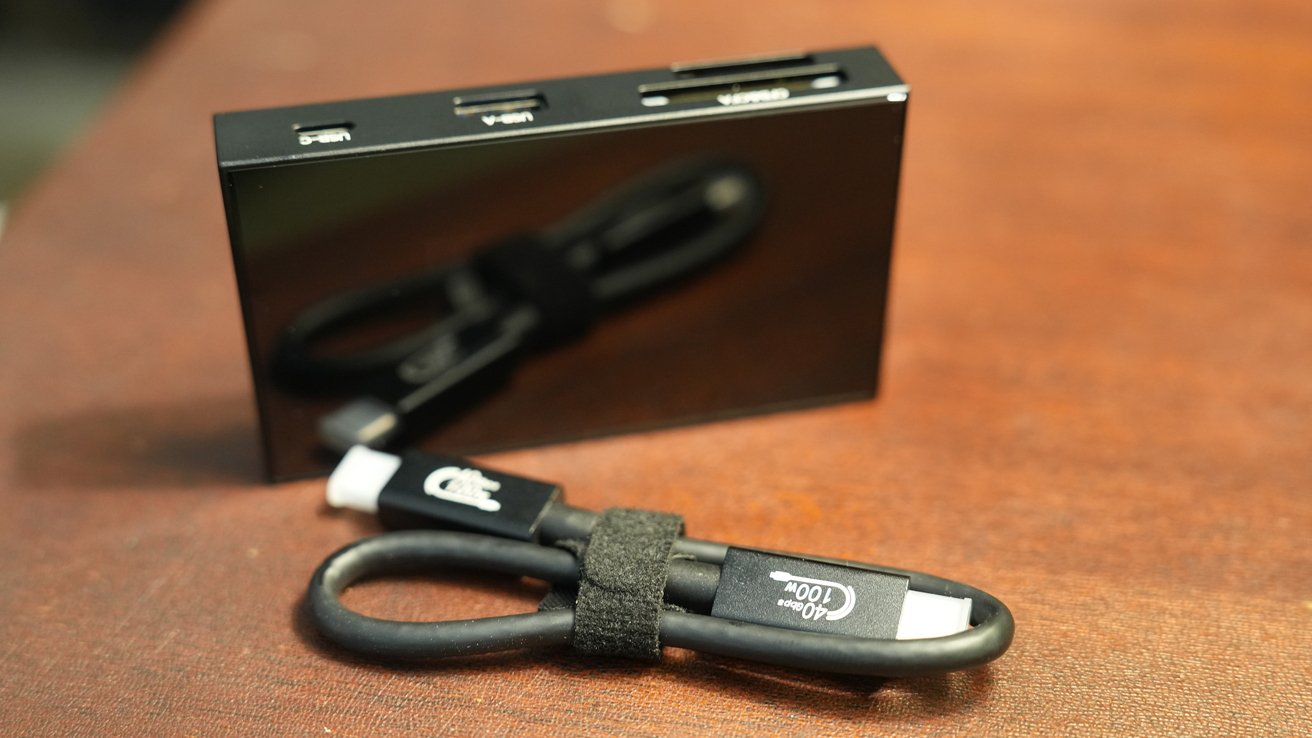 The included cable is rated for the highest USB speeds, but is a bit short when plugged into the back of a Mac.
The included cable is rated for the highest USB speeds, but is a bit short when plugged into the back of a Mac. Dockcase Studio Smart USB-C Hub 8-in-1 - Why include a screen?
Dockcase's literature for this hub touts the built-in color display on the top of the unit, and certainly, it's what sets it apart. I've been using this hub for weeks now, and I'm not unhappy it has a screen, but I still haven't found a compelling reason to use it.
The screen provides information about the ports, connection speeds, incoming power, and HDMI performance. You can tell at a glance if cards are in the SD or CFe slots.
A power status indicator shows how much juice the hub is using and whether the connected cables can use the maximum power of the USB-C PD connection.
Thanks to CFe cards' features, the hub can display their health, the number of hours used, and any disconnections where the cards weren't ejected properly. None of this information is available with SD or MicroSD cards, as neither standard supports recording this information.
The screen is bright and well laid out, and the touch interface works like similar embedded displays. It's not an iPhone display, but the touch interface is quick enough not to feel laggy, and it's easy to swipe through the data screens.
That said, almost none of this data is useful. You can tell how many cards are inserted in a hub by looking at it. If you buy a high-speed USB-C dock, the ports naturally operate at the fastest speeds possible for the cables and devices.
Likewise, I know what resolutions and refresh rates are supported with HDMI status because that information is listed in System Settings.
What I wish Dockcase had done was build extra functionality into the hub.
More than a decade ago, Epson had a device for photographers with a card reader slot and an internal hard drive. Inserting the card into the device triggered a backup of all new files to the internal drive.
I would love a hub with a display that allowed inserted memory cards to be backed at the touch of a button. There are numerous situations where I'd like to back up a card full of video files without bringing my Mac.
The package for the Dockcase Studio made me think that these features were part of the device. The box reads Smart USB Hub And Drive. I had hoped the hub had some degree of internal storage.
Instead, it looks like the word "drive" relates to the fact that there are card readers in the hub. I suspect this wording will be removed on the final packaging since there are no references to a drive on the product's Kickstarter page.
Dockcase Studio Smart USB-C Hub 8-in-1 - Other options abound
On the topic of pricing, let's look at the competitive landscape.
The Dockcase Studio Smart USB-C Hub 8-in-1 is $200. I could find no other hubs with CFe slots, let alone with CFexpress Type A and CFexpress Type B. If you want a hub with these slots, this is your best and very likely only option.
Stand-alone readers for CFe cards range from $10 to just over $100. They aren't as convenient as one built into a hub, so the Dockcase Studio Smart USB-C Hub 8-in-1 might fit your needs. But you'd pay a hefty premium over a separate USB-C hub and a dedicated reader.
The market for multi-function hubs is massive, a simple Amazon search brings up pages of hubs from reputable companies and from a vast array of third-party relatively unknown products.
Anker, one of the better-known brands and one that many Apple users turn to for reliable power supplies and other products, has several hubs priced much lower than the Dockcase.
Its 14-in-1 USB-C Hub has multiple USB A and C ports, although they operate at USB's slower five gigabits per second speeds. But it offers more USB ports, plus Ethernet and HDMI.
Anker also has a $149 Thunderbolt 4 mini dock. This device has multiple combo Thunderbolt 4 and USB-C ports and operates at 40 gigabits per second when connected to a Thunderbolt device. The dock can also power a display up to 8K.
The tradeoff is the lack of the Dockcase's multiple car readers.
The closest alternative USB-C dock I know of that supports CFexpress is OWC's Thunderbolt Dock Pro. Nearly $200 more than the Dockcase solution, the Thunderbolt Dock Pro is overkill for the audience the Dockcase targets.
The lack of portability on the OWC dock eliminates it from competing with the Dockcase, which is another point in favor of the Dockcase hub.
You can get hubs and docks that are cheaper. You can get external card readers that support CFe-A or CFe-B cards. You can't get a combination of a high-speed, portable hub with a built in CFe card reader from any other company.
Dockcase Studio Smart USB-C Hub 8-in-1 - Pros
- Support for both CFexpress card types
- Solid, durable design
- USB-based power eliminates the need for AC brick
- Top-end USB-C performance
- Built-in display gives at-a-glance status
Dockcase Studio Smart USB-C Hub 8-in-1 - Cons
- Need for a built-in display is questionable
- High price relative to other solutions
Rating: 3.5 out of 5
Despite the range of competitor products at a lower price point, none offer the same selection of connectivity options as the Dockcase.
As a photographer, I like the idea of a dock supporting the newest memory card standards. As a mostly Sony shooter, I don't need the CFe-A reader. Having a port I don't use is fine as long as I get the port I do need. The clever design of this hub means I'll always have the card reader I need.
I hope Dockcase considers making a hub offering CFe-A and CFe-B at a lower price without a screen.
Otherwise, the hub's durable design and the clever inclusion of the new card slots make this a tantalizing product at a price that's just out of my reach.
Where to buy the Dockcase Studio Smart USB-C Hub 8-in-1
As of the writing of this article, the Dockcase Studio Smart USB-C Hub 8-in-1 is a Kickstarter project, and is fully funded. It is expected to retail for $199.
 David Schloss
David Schloss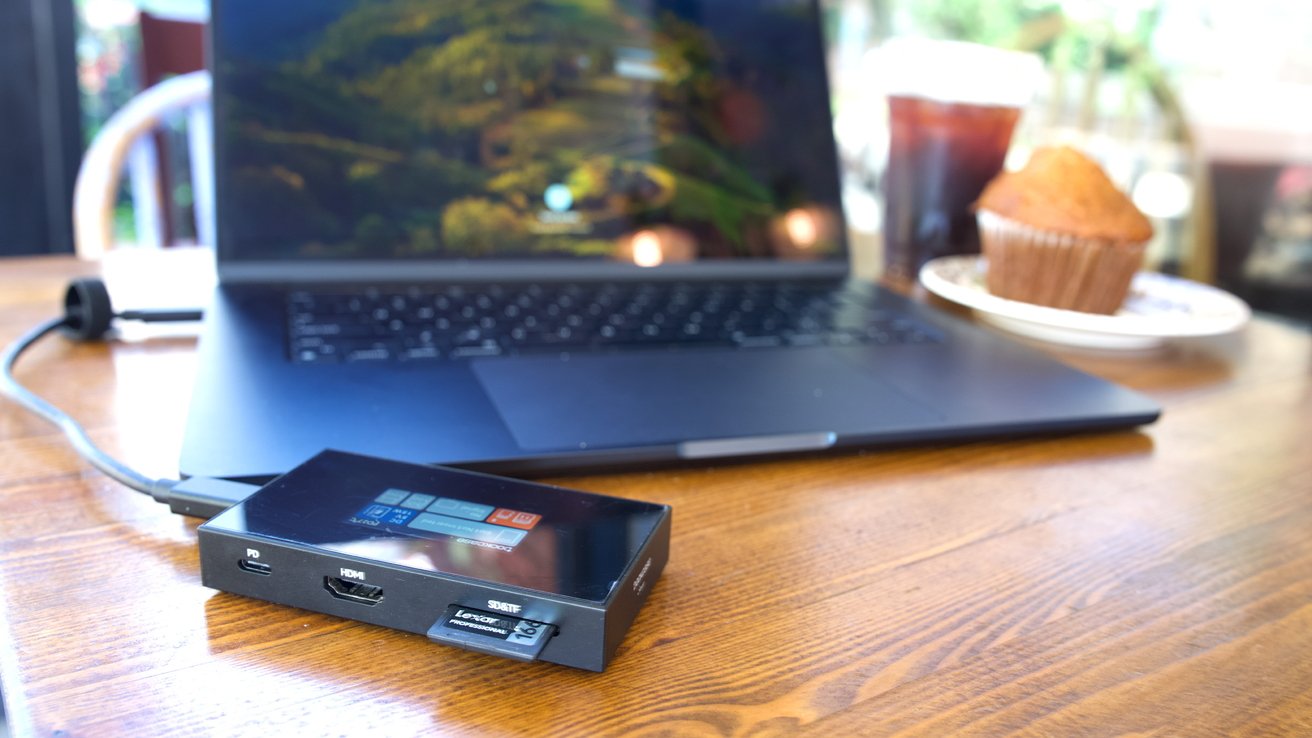
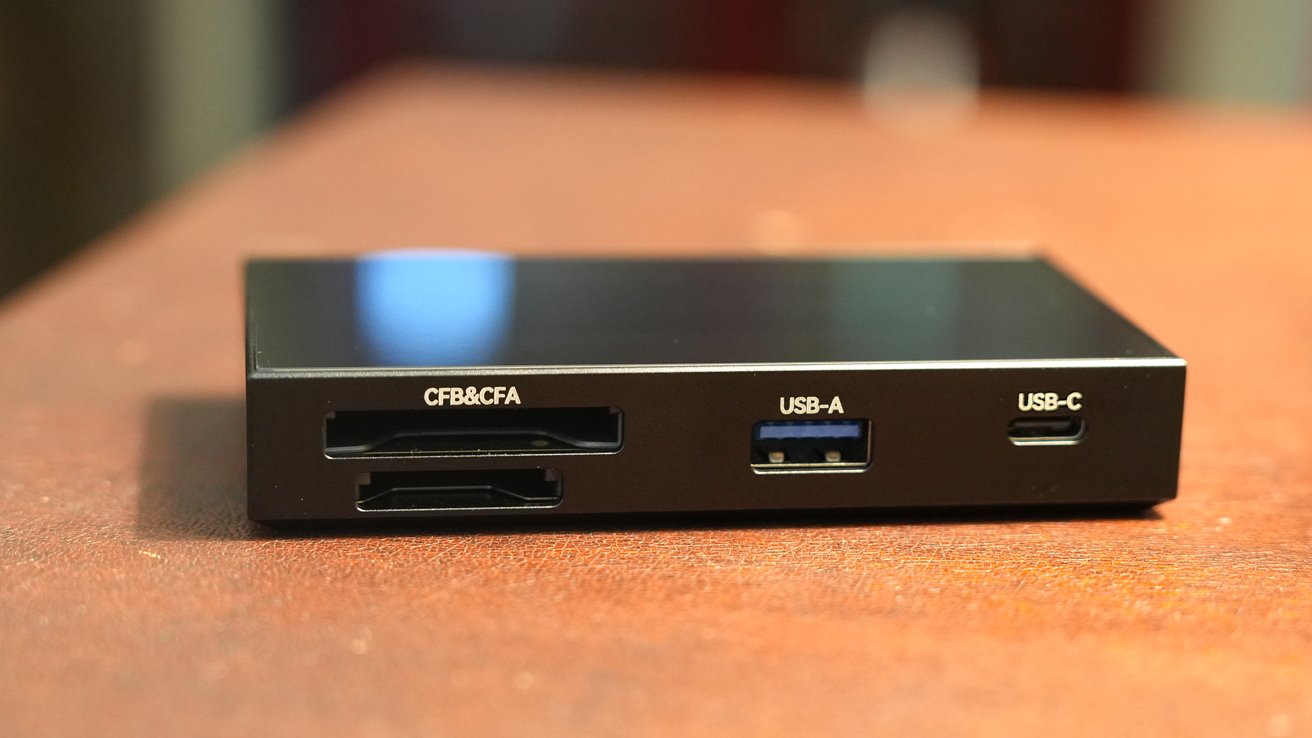
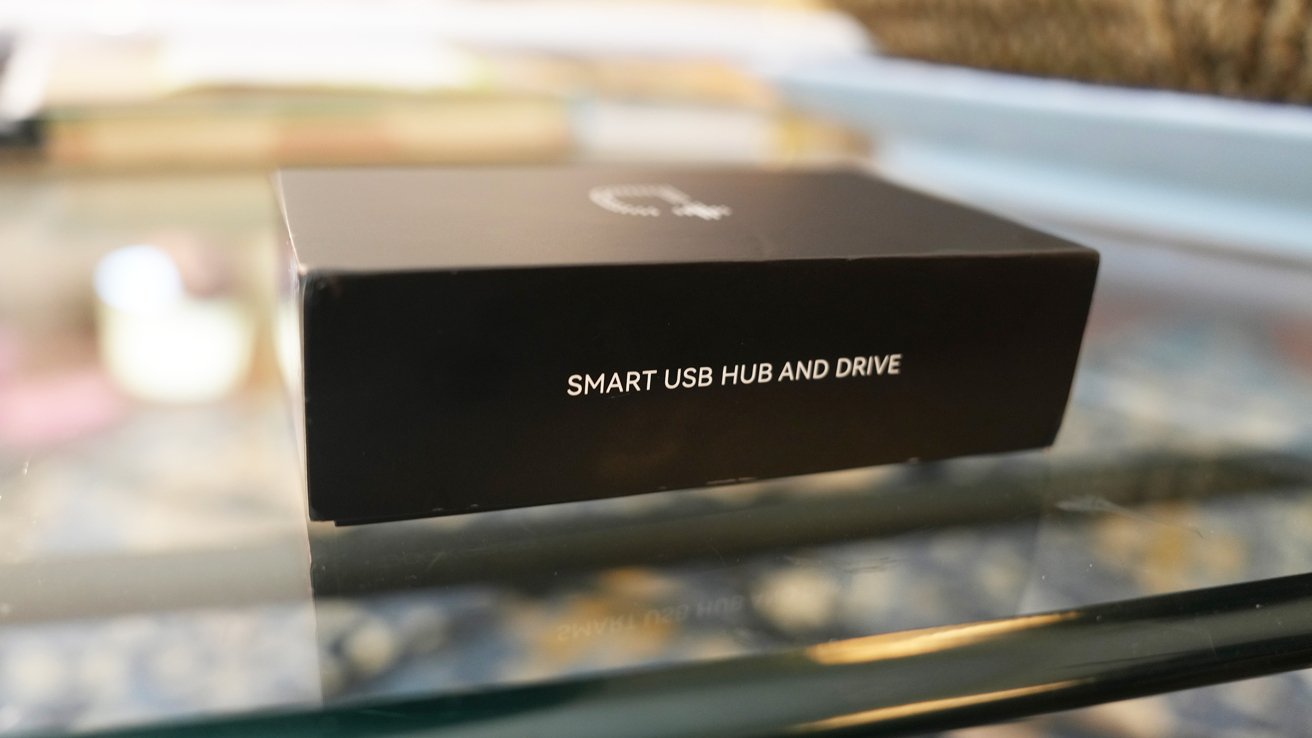
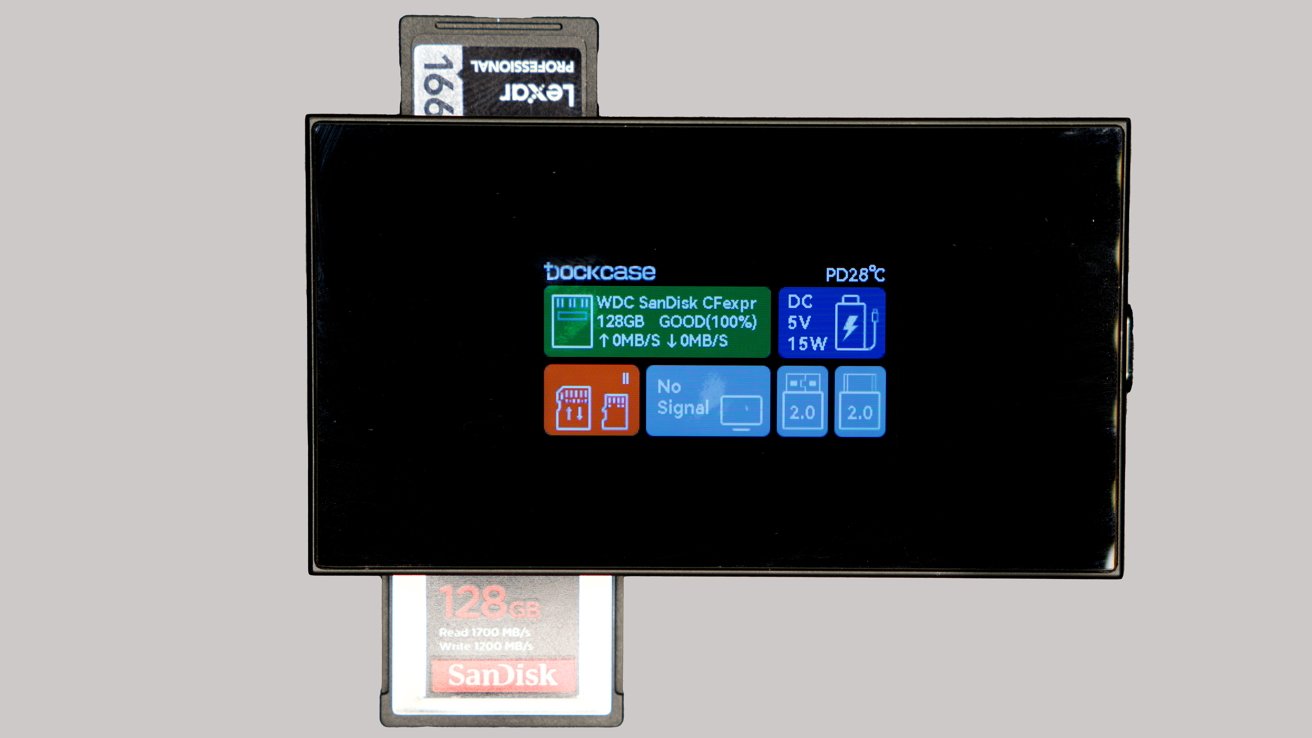
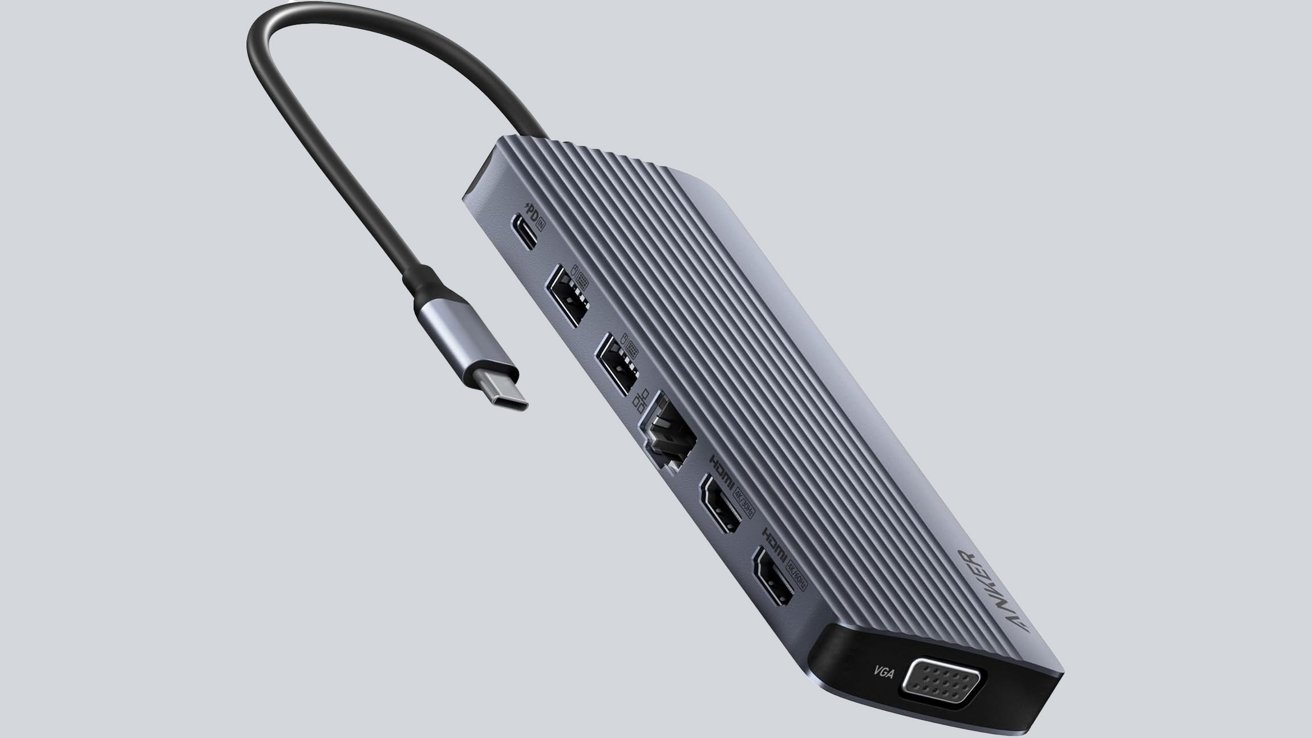
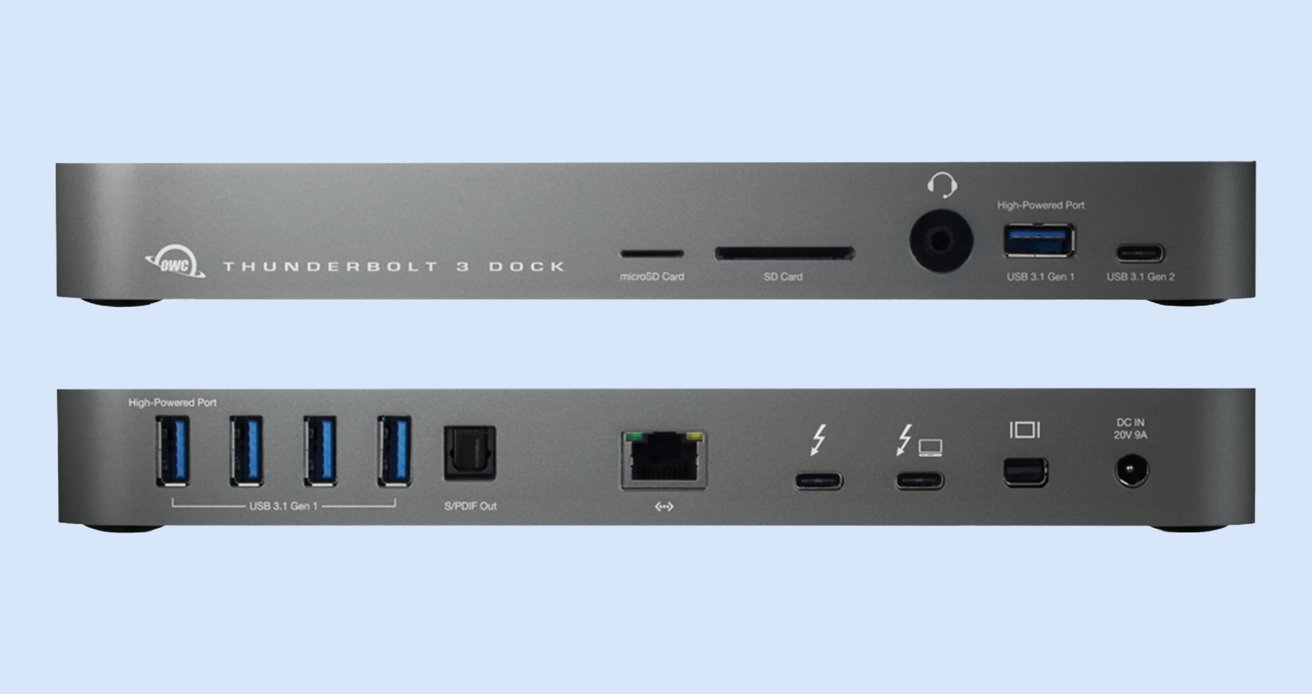








 Marko Zivkovic
Marko Zivkovic
 Mike Wuerthele
Mike Wuerthele
 Christine McKee
Christine McKee
 Amber Neely
Amber Neely
 Sponsored Content
Sponsored Content
 Wesley Hilliard
Wesley Hilliard

 William Gallagher
William Gallagher









1 Comment
I have to admit that this is one product category that makes my head spin. There are so many variations with widely different I/O and video port combinations that make it hard to do an apples to apples comparison. A lot of the more expensive models have what seems to me to be redundant features.
Finally, the reviews that are done by any number of product computer review sites are often far different than the user reviews on Amazon and other shopping sites. Of course you have to keep in mind that a lot of buyers who are satisfied with a product will not do online reviews so the weight of 1-star reviews is probably disproportionately skewed higher than it really is.